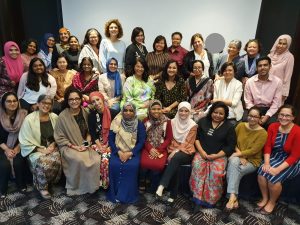In October 2019, Musawah hosted a South and Southeast Asia Regional Workshop on Muslim Family Law (MFL) Reform in Kuala Lumpur, Malaysia. As the first of our regional workshops as part of the Musawah Campaign for Justice in Muslim Family Laws, to be launched in 2020, we were honoured to have 36 participants from 14 countries (9 South Asia/Southeast Asia, 2 Middle East/North Africa, 2 Sub-Saharan African countries and USA).
The regional workshop brought together participants from different national contexts to learn and strategise together about innovative collective action to change discriminatory Muslim family laws and practices, culminating in a drawing session on Imagining Our Way Forward to the feminist futures we envisioned together. It also allowed us to strategise together ahead of the Asia-Pacific Beijing+25 Regional CSO Forum (24-26 November 2019).
Egalitarian reform of family law may be the most crucial precondition for empowering women economically.
Mala Htun, Francesca R Jensenius, Jamic Nelson-Nunez (2018), Gender Discriminatory Laws and Women’s Economic Agency, in Social Politics: International Studies in Gender, State & Society, https://doi.org/10.1093/sp/jxy042, p. 3. Tweet
This three-day workshop is really the beginning of our global campaign—to build a truly global movement. We hope this contributes to progressive steps, not even radical steps, towards justice for Muslim women, their families and their communities.
Zainah Anwar, Musawah Tweet
Our slogan in Hindi: "If it's my struggle, it has to be my leadership."
Noorjehan Safia Niaz, Bharatiya Muslim Mahila Andolan Tweet
Check back here as we add more updates from the workshop and from our South and Southeast Asian participants as the campaign moves forward!
Updates from the Asia-Pacific Beijing+25 Regional CSO Forum (24-26 November 2019)
- take immediate steps to promote women’s equality and non-discrimination in family laws and practices, by recognizing women’s equal status in marriage and family;
- comply with international conventions on human rights to respect, protect and realize women’s right to equality in the family, across all types of family law, including those based on religious and customary legal standards;
- recognize that customs and traditions evolve, that interpretations of sacred texts have progressed to uphold equality and justice to reflect changing times and circumstances, and that many States have amended discriminatory provisions in family laws founded on progressive understandings of religion and tradition;
- acknowledge emerging research that family law is the single biggest predictor on women’s economic empowerment, where discrimination in family law is significantly associated with women’s labor force participation, ownership of assets and ownership of bank accounts, and that the continued discrimination of women and the girl child in the family directly affects progress on the Beijing Declaration and Platform for Action;
- be guided by SDG Indicator 5.1.1 which has identified family law as one of the four legal frameworks that must be reformed to accelerate progress to promote, enforce, and monitor gender equality; UNWomen’s report on Families in a Changing World, which called for family laws that recognize diversity and promote equality and non-discrimination, and its Equality in Law for Women and Girls by 2030: A multistakeholder strategy for accelerated action, which identified promoting equality in family relations as one of the six areas of focus to accelerate action towards gender equality by 2030.

